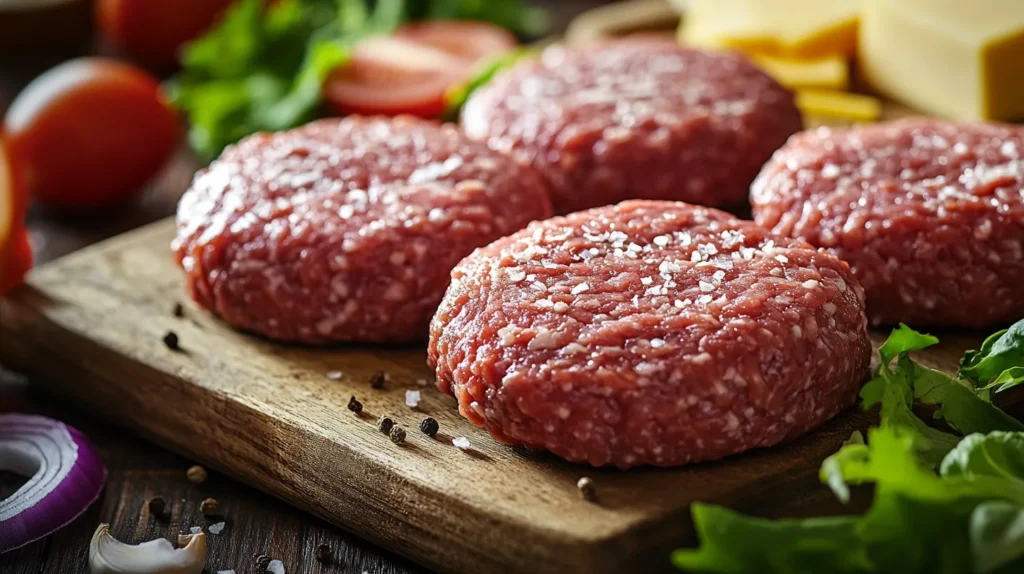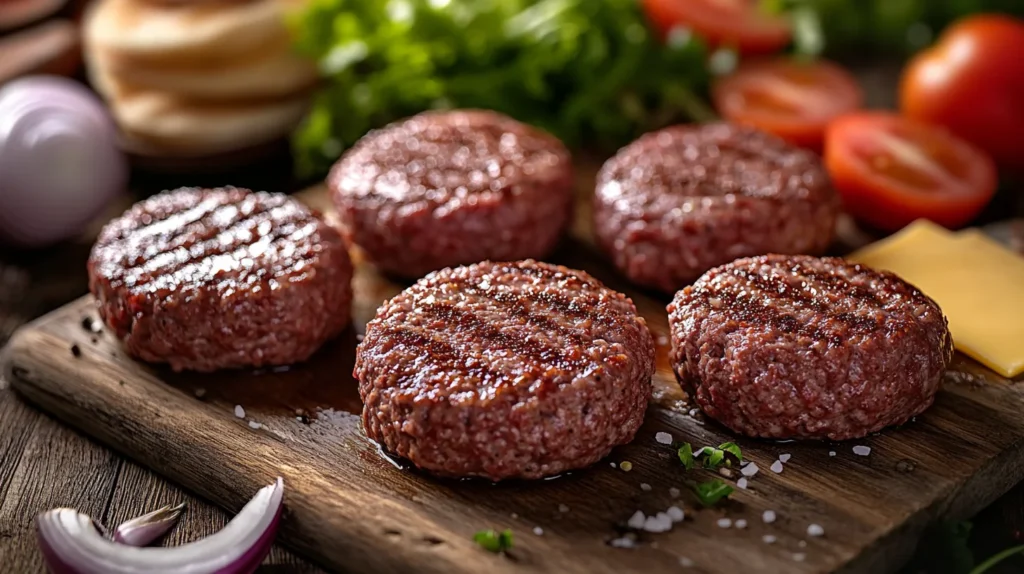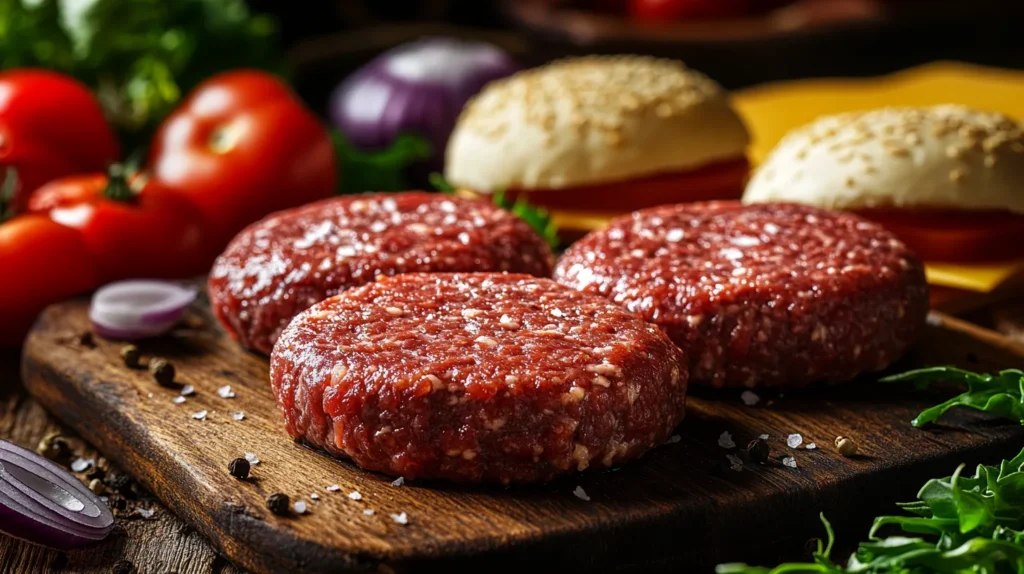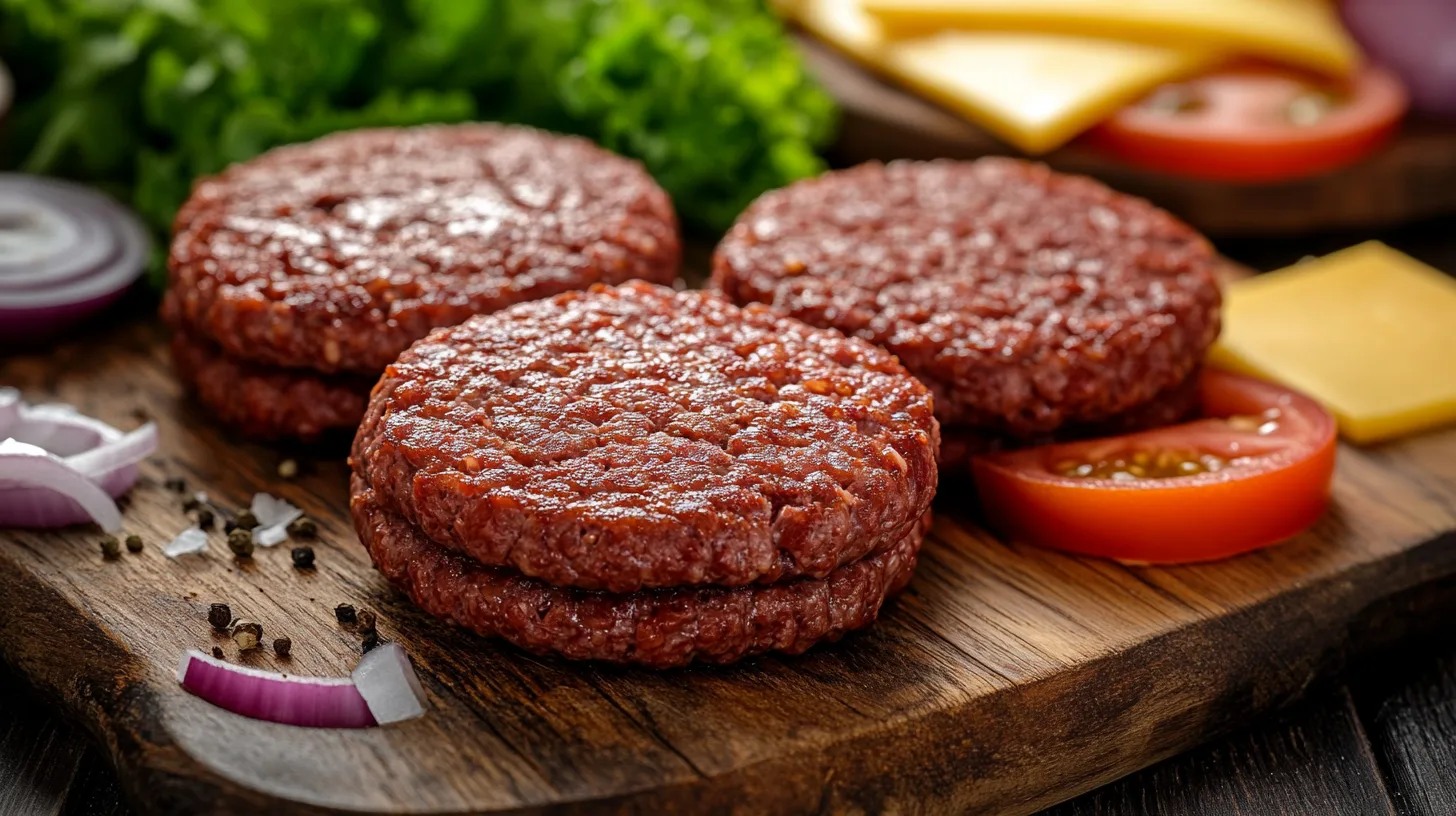Discovering The Healthiest Meat for Burgers – Making Informed Choices for Your Next BBQ
When it comes to grilled delights, burgers are a beloved staple that brings friends and families together. However, not all burger meats are created equal. As we navigate our dietary choices—whether for health, ethical reasons, or personal taste—the quest for The Healthiest Meat for Burgers becomes more crucial than ever. This article will delve into various meat options, including traditional choices as well as innovative alternatives, to help you make informed decisions at your next cookout.
Understanding the Nutritional Profiles of Popular Meats
Choosing the right meat for your burger is about more than just flavor; it’s about understanding the nutritional profiles of each option available to you. This section will explore some popular meats, shedding light on their nutritional benefits and potential pitfalls.
Lean Beef: A Classic Choice
Lean beef is often the go-to choice for traditional burger enthusiasts. While it boasts a robust flavor and satisfying texture, it is essential to understand which cuts are best when aiming for a healthier option.
Overview of lean beef cuts for burgers
Not all cuts of beef are created equal, especially when it comes to making burgers. Cuts like sirloin, tenderloin, and eye of round are much leaner than regular ground chuck, containing less fat while still delivering an exquisite taste. Lean ground beef typically contains anywhere from 10% to 15% fat compared to the fattier counterparts that may exceed 20%.
Nutritional benefits: protein content, vitamins, and minerals
One of the standout features of lean beef is its high protein content, which is fundamental for muscle repair and growth. Furthermore, beef is a rich source of essential nutrients such as iron, zinc, and B vitamins, which are critical for energy production and cognitive function. For those who lead active lifestyles, opting for lean beef can contribute significantly to your overall nutrition.
Potential health concerns: saturated fat and cholesterol levels
While lean beef has many advantages, it’s also important to be mindful of saturated fat and cholesterol levels. Although lean cuts have reduced fat content, some still contain measurable amounts of saturated fats, which can contribute to heart disease if consumed in excess. Moderation is key—consider balancing your diet with other protein sources and ensuring your overall fat intake aligns with recommended dietary guidelines.
Turkey: A Lean Alternative
Turkey has gained immense popularity as a healthier alternative to beef, particularly among health-conscious consumers. Its lower calorie and fat content make it an attractive option for those wanting to indulge guilt-free.
Nutritional comparison to beef and other meats
Generally, turkey burgers offer a striking contrast to traditional beef burgers. Ground turkey typically contains fewer calories and fat grams than even the leanest cuts of beef. Additionally, turkey is rich in protein and contains less saturated fat, making it an appealing choice for anyone looking to reduce their fat intake without sacrificing flavor.
Health benefits: lower fat content and high protein
Turkey’s notable advantage lies in its lower fat content, particularly saturated fat, making it a heart-healthy option. It also offers ample protein, which supports muscle maintenance and helps keep you feeling full longer. Incorporating turkey into your burger repertoire can lead to a lighter meal with vital nutrients that won’t weigh you down.
Flavor profiles and cooking tips for turkey burgers
One common concern with turkey burgers is their propensity to dry out during cooking. To combat this, consider using a mix of ground turkey thigh and breast for added moisture. Season generously with spices and herbs to enhance the flavor—garlic powder, onion powder, and fresh herbs can elevate your turkey burger to delicious new heights. Grilling or pan-searing are both excellent methods to lock in moisture while achieving a beautiful sear.
Chicken: Versatile and Nutritious
Chicken is another versatile option that provides numerous possibilities when creating healthier burgers. Its neutral flavor profile allows it to adapt to various cuisines, making it a favorite among burger lovers.
Different cuts of chicken for burger preparation
When preparing chicken burgers, various cuts can be utilized. Ground chicken is often the top choice, but you can use chicken breasts or thighs as well. For a richer flavor, chicken thighs offer more fat, whereas breasts are leaner and higher in protein. Ultimately, the choice between these cuts depends on your desired flavor and nutritional goals.
Analysis of nutritional advantages: lower calories and fats
One of the most significant advantages of chicken is its low-calorie count. Chicken breast, for instance, is not only low in calories but also packed with protein, making it a fantastic option for those looking to stay fit while enjoying their meals. Moreover, the fat content is generally lower than that of red meats, helping to create a balanced dish that satisfies hunger without unnecessary calories.
Recommendations for seasoning and preparation methods
To ensure your chicken burgers are anything but bland, exploring various seasoning blends is essential. Marinades made from yogurt or citrus juices can add depth and enhance tenderness. Experimenting with different cooking techniques, like baking or grilling, can also yield delightful results, allowing you to enjoy a savory burger that’s healthy too.

Exploring Red and Processed Meats
As we navigate the world of meats for burgers, it’s crucial to understand the differences between traditional choices and their healthier alternatives. Here, we’ll discuss two lesser-known meats: bison and venison. These alternatives are nutrient-dense and flavorful while offering unique health benefits.
Bison: A Nutrient-Dense Option
Bison meat is steadily gaining popularity as a healthier alternative to traditional beef. Not only does it rival beef in flavor, but it also packs a powerful nutritional punch.
Nutritional overview and comparisons with traditional beef
Compared to conventional beef, bison meat has a much lower fat content, while still providing substantial protein. It is also a great source of omega-3 fatty acids, which are known for their anti-inflammatory properties and heart health benefits. Bison is rich in essential vitamins like B6, B12, and niacin, contributing to overall wellness and vitality.
Health benefits: omega-3 fatty acids and lower fat content
Including bison in your diet can provide valuable omega-3s, which are often lacking in typical Western diets. The lower fat content translates to fewer calories per serving, making bison an excellent choice for anyone looking to maintain a healthy weight. By incorporating bison burgers, you can enjoy all the classic flavors of a beef burger while benefiting from a more nutrient-dense option.
Cooking techniques and flavor notes
Bison meat cooks faster than beef due to its lower fat content, so it’s essential to be cautious not to overcook it. Keeping the temperature moderate ensures a juicy, tender burger that retains its full flavor. Just like beef, bison pairs beautifully with toppings like sautéed mushrooms or sharp cheeses, making it a versatile addition to your burger options.
Venison: The Wild Game Choice
Venison is another intriguing option that deserves exploration. As a leaner meat with a unique flavor profile, it can be an exciting addition to any burger lineup.
Nutritional benefits and distinct flavor profile
Venison offers lower fat and calorie counts compared to traditional meats, making it an attractive option for health-conscious consumers. It is also an excellent source of protein, iron, and B vitamins. The distinct gamey flavor adds an adventurous twist to your burger experience, pleasing those seeking something different from the ordinary.
Discussion on sustainable sourcing and environmental impact
Another vital aspect of venison is sustainability. Many hunters engage in responsible practices, such as harvesting deer populations to preserve ecological balance. Choosing venison can align with environmentally conscious eating habits, promoting conservation efforts while indulging in delicious food.
Preparation tips for optimal taste
To bring out the rich flavor of venison, consider marinating the meat before grilling. Ingredients like red wine, garlic, and rosemary work wonders to tenderize the meat while enhancing its natural flavors. Cook the burgers to medium-rare to retain juiciness, and remember that wild game often requires a different approach than farm-raised meats.

Vegetarian and Plant-Based Options
In recent years, there’s been a noticeable trend toward plant-based diets, leading to an explosion of creative alternatives to traditional meat burgers. Whether motivated by health, ethics, or environmental concerns, these options provide diverse choices for everyone.
Beyond Meat: Innovative Alternatives
Beyond Meat and similar brands have revolutionized the way we think about plant-based burgers. With their focus on mimicking the taste and texture of meat, they offer an alluring option for both vegetarians and those simply seeking to cut back on meat consumption.
Overview of plant-based meat options for burgers
Plant-based burgers are typically made from pea protein, brown rice, and a variety of vegetables, designed to replicate the experience of eating a traditional burger. Brands like Beyond Meat and Impossible Foods have invested significantly in research and development to create products that satisfy meat cravings while aligning with a plant-based lifestyle.
Nutritional analysis compared to animal proteins
While plant-based meats often boast comparable protein content to their animal counterparts, they tend to have lower cholesterol and saturated fat levels, reducing the risk of heart disease. However, it’s essential to evaluate ingredient lists, as some processed options may contain added preservatives or sodium, which could detract from their health benefits.
Health implications and dietary preferences
The rise of plant-based diets can lead to improved health outcomes for many individuals. By incorporating more fruits, vegetables, and legumes into your diet, you may lower your risk for chronic diseases. However, it’s vital to listen to your body and ensure you’re getting enough nutrients, particularly vitamin B12, iron, and omega-3 fatty acids, which may require additional supplementation in a strictly vegan diet.
Black Bean and Chickpea Burgers: Fiber-Rich Choices
For those looking to explore simpler homemade options, black bean and chickpea burgers are excellent choices that can pack a nutritious punch.
Nutritional benefits of legumes in burger form
Beans are rich in dietary fiber, protein, and various micronutrients, making them an ideal foundation for a healthy burger. Black beans and chickpeas are particularly beneficial in aiding digestion and promoting satiety, helping you feel fuller for longer while keeping calorie counts down.
Recipes and cooking suggestions for homemade versions
Crafting your own black bean or chickpea burgers is a simple and rewarding task. Combine mashed beans with breadcrumbs, spices, and vegetables for a delicious patty that reflects your tastes. Consider adding ingredients like corn, cilantro, or jalapeños for added excitement. Baking or pan-frying these patties can help maintain their shape while achieving a delightful crust.
Benefits of integrating plant-based diets for overall health
Switching to plant-based options offers endless opportunities to explore new flavors, textures, and nutrients. Regularly consuming diverse legumes, whole grains, fruits, and vegetables can lead to improved overall health outcomes, including weight management, decreased risk of chronic diseases, and enhanced mental well-being.

FAQ:
Healthiest Burger You Can Make
A nutritious burger balances lean protein, healthy fats, and fiber-rich ingredients. Here’s how to build a healthier burger:
- Patty: Use lean ground turkey, chicken, bison, or salmon for a lower-fat, high-protein base.
- Bun: Opt for a whole-grain or sprouted grain bun, or go bunless with lettuce wraps or portobello mushroom caps.
- Toppings: Load up on veggies like spinach, tomatoes, onions, and avocado for extra nutrients.
- Condiments: Choose mustard, Greek yogurt-based sauces, or homemade hummus instead of mayo and sugary ketchup.
Best Meat for Burgers
- Bison – Leaner than beef, rich in protein, iron, and omega-3s.
- Turkey – Lower in saturated fat than beef, but still high in protein.
- Salmon – High in heart-healthy omega-3 fatty acids.
- Grass-Fed Beef – Contains more omega-3s and antioxidants than grain-fed beef.
Healthiest Way to Eat a Hamburger
- Skip the white bun – Use whole-grain, lettuce wraps, or sweet potato slices.
- Load up on veggies – Add leafy greens, tomatoes, onions, and fermented toppings like kimchi.
- Avoid processed cheese and fatty sauces – Use healthier alternatives like goat cheese or homemade Greek yogurt sauce.
- Grill or bake the patty instead of frying to reduce excess fat.
Healthiest Ground Meat
- Ground Turkey or Chicken (93% lean or higher) – Low in fat and high in protein.
- Bison – High in protein, iron, and omega-3s with less saturated fat than beef.
- Lean Grass-Fed Beef (90% lean or higher) – More nutrient-dense than conventional beef.
- Ground Salmon or Tuna – High in omega-3 fatty acids, beneficial for heart health.
Conclusion
In conclusion, the quest for The Healthiest Meat for Burgers reveals a myriad of choices for discerning palates. From classic lean beef and turkey to unique options like bison and venison, each meat has particular benefits worth considering. Additionally, plant-based alternatives provide exciting flavors while catering to a wide range of dietary preferences.
Ultimately, the best choice depends on individual dietary needs, preferences, and nutritional goals. By experimenting with various meats and plant-based options, you can cultivate a balanced approach to your burger creations, ensuring that every cookout is both delicious and nourishing. Embrace the diversity of flavors and nutrients available, and let your taste buds guide you to your ideal burger.
Try More Tasty Recipes
Craving more flavorful dishes? Explore these delicious recipe ideas:

